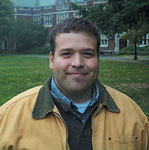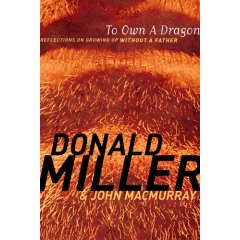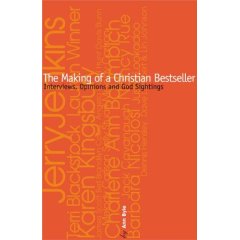Here's an article I wrote for Christian Single last year:
Scared Single
Written by Jen AbbasThis article is courtesy of
Christian Single.
Perhaps it's no coincidence that a generation raised on divorce has grown up to be skittish about marriage. As a 32-year-old, never-married single, I know. I weathered two parental divorces, one at age 6 and another at 18. Like most children of divorce, I could appreciate how the divorces made me stronger, more driven, and more independent. It wasn't until my early 20s, however, that I realized how my parents' divorces made me weaker, more insecure, and too self-reliant. I was weak because I believed I had to be successful, or I wouldn't be worthy of love. I was insecure because the love I knew was fickle and fleeting, and I was forever looking for a way to make love stay. I was so independent that I never needed anyone, and as a result, no one needed me.
While I had great confidence in my professional abilities, I questioned my emotional ones. I wondered if I had what it took to make a marriage work. In fact, I wasn't even sure what a workable marriage looked like. I realized that I had bought the lie our society has swallowed hook, line, and very heavy sinker: divorce is something we get over in time. The hard truth is that we don't really come to terms with the full effect of our parents' divorce until we face the possibility of our own marriages. That epiphany terrified me.
In talking with other adult children of divorce, I discovered that I am far from being alone. There's a growing number of us who have to ask the unsettling question: Am I still single because my parents are divorced?
Of course our parents' divorce doesn’t excuse our behavior, but it does help explain it. From my conversations, several common themes surfaced.
"I Don't Want to Get Divorced, So I Just Won't Get Married"By far the easiest way to avoid divorce is to avoid marriage. One 27-year-old, whose parents divorced when she was 2, reflected, "Statistics and experience show that marriages are unlikely to last … so it seems like it would save a lot of heartbreak not to marry at all."
While our friends outside church walls may consider living together as a foolproof way of avoiding divorce, I suspect that the rise in popularity of courtship is partially rooted in a fear of exploring a relationship without guarantees. The intentionality of courtship is attractive because it removes the insecurity of not knowing another's intentions and places secure guard rails on a very scary ride.
The reality is that anything worth pursuing is worth the risk it takes to achieve it. Fear was never God's intended motivator. Ironically, the best way to defeat our fear of love is to choose to love. Fear is based on rejection. Love is based on acceptance.
Many of us have grown up fearing love because we fear the end of love, and yet fear is the opposite of love. Fear is self-centered: what will they do? Love is other-focused: what can I do? Fear is one of Satan's greatest weapons because he knows that if we dwell on our fears, we're forfeiting our ability to both give and receive the love we yearn to experience. When our focus is on others — on loving — we're on the road to healing our wounded hearts.
"I Don't Trust My Own Instincts""We have found that many people misunderstand their own mating instincts and thus have very bad 'radar' for attracting and picking partners," say counselors and adult children of divorce Tom and Beverly Rodgers in their book,
How to Find Mr. or Ms. Right. If our parents told us that everything was fine despite the obvious tensions lingering in our home, we may have learned to shut down our intuitive interpretation of a situation to make it compute with what we were told. Unfortunately, we don't automatically regain our ability to accurately assess our relationships.
Michael, a 36-year-old, never-married single confesses, "[The divorce] has affected my self-esteem as to whether I am relationship-material." As adults, this disconnect can show up as we misinterpret a relationship by assuming a commitment that isn't there, or fail to recognize a healthy relationship when we're in one because it isn't what we know.
In our tenacious desire to avoid what we have survived, we shy away from intimate relationships because we don't want to be hurt, and as a result, we end up hurt because we lack the kind of relational intimacy we're hard-wired by God to crave.
We can enhance our chance for relational success by surrounding ourselves with trustworthy advisors. Look for mentors — especially a couple around your parents' age — who are willing to share their wisdom and experience with you. As you consider a romantic relationship, invite your advisors to either caution or confirm your choice. Be sure to ask them why they feel the way they do, so you can use that information to make better decisions in the future or as affirmation that you did make a good choice.
"I'm Afraid to Let Anyone Get Too Close"Recently, my mentor, Fred Stoeker, co-author of the popular
Every Man's Battle series and a child of divorce, discussed with me the relatively recent phenomena of DTRs. The "Define the Relationship" talk is meant to be a way of clarifying intentions in a relationship. At their best, DTRs can help a couple understand the definition and direction of their relationship. At their worst, Stoeker says, DTRs offer preemptive rejection.
When a generation has been raised to see the worst in marriage, the natural tendency is to try to stack the relational deck to protect us from even the possibility of pain. Rather than seeing the potential for deeper friendship in the possibility of love, we run from either prospect because we can't guarantee the outcome. We hate living in limbo, so we project a "no" where maybe there's only a "not yet." And in doing so, we feel the hurt of heartache before we experience the delight of discovery, thus reliving what's become normal for us. Or as Stephanie Staal, author of
The Love They Lost: Living With the Legacy of Our Parents' Divorce, writes, "We knew too much about how relationships ended before our own relationships had even started."
Even in our friendships, we may make those around us jump through hoops yet run away from any hoops presented to us. We expect others to love us unconditionally before we take away the conditions of our love. Often we're blind to the mixed messages we send. But while we cannot make anyone love us, we can let ourselves love.
Tomorrow is not guaranteed to us. As singles hopeful of marriage, we can only receive what's offered to us today. If friendship is all that is fully offered, then that friendship is what we need to fully receive, because it may be through that friendship — and only friendship — that God can teach us what we need to learn. Our goal in life is not to avoid pain but to allow the intimacy of being fully known to reveal those parts of ourselves that need refining. As Stoeker says, "Be open to what God might have you learn from your friends, especially those of the opposite sex. Loosen the reins, and learn to enjoy where you are today."
"I'm Too Independent"We have learned to protect ourselves, and in the process, our hearts may have become so callused that we may not know how to let others in. But our independence is counterproductive to the interdependence needed for successful relationships.
Stephanie Rossing, a marriage and family therapist and child of divorce, explains that our protective devices hinder our ability to heal and develop the relationships we ultimately desire. "We tend to, based on our family of origin experience, make inner vows. For example, 'I'll never be like my father who abandoned our family,' or 'I'll always make time for my kids,'" Rossing says. "We tend to look at our family in extremes to make vows that seem good, but in actuality, these vows are harmful because they keep us from dealing with righteous anger and pain in healthy ways."
These inner vows are based on a negative energy and judgments on others. They're a way of intellectualizing our emotions instead of experiencing them. Rossing concludes, "When we push through and allow God to surface the righteous anger and pain, we give Him the opportunity to correct our faulty hard-wiring."
We can learn to get beyond what holds us back by learning to let others rely on us and allow ourselves the freedom to rely on others. Pet ownership is a wonderful way of learning to both give and receive unconditional love. Roommates also provide the opportunity to reveal and refine our overly-independent natures.
“I Don’t Know What a Healthy Relationship Looks Like”For us, finding a good spouse is like putting together a puzzle without the box cover as a guide. Kathryn, whose parents divorced after 31 years, relates, "I have doubts as to what kind of man to look for. I had compared men to my father, but that comparison won't do anymore."
Fumbling with the pieces of our lives, we may struggle to construct a working model of marriage. Divorce declares that there are times when we're not obligated to forgive. Divorce demonstrates to us that it's more important to be right than righteous. Divorce teaches us to fight but not to forgive. Somewhere within us, we have an idea of what our ideal marriage looks like, even if we haven't seen it in tangible form. These snapshots provide glimpses of our goals, and we've collected them, knowingly or not, as we looked with longing at the families of our friends. The Bible, books on marriage, and the families around us can provide a more healthy and realistic template for lifelong love. Learn to recognize the qualities you're looking for by writing them down. Use the list as an objective measure to determine if a date is a good match. The list also makes a convenient prayer guide for the lonely days when we long for what we lack.
Ultimately, whatever our marital status, whatever the marital status of our parents, each of us has this same charge: to take all that we are, for better or worse, and allow God to use it for His glory. We serve a God of redemption. In fact, it's His specialty, and He will stop at nothing to show us how willing He is to redeem our hurts and heal our broken hearts. As believers, we're no longer victims of our past. We're now sons and daughters of a Father who loves us more than we can ever imagine.
Related Articles:
The Single Fear FactorSurviving DivorceSingle Truths




